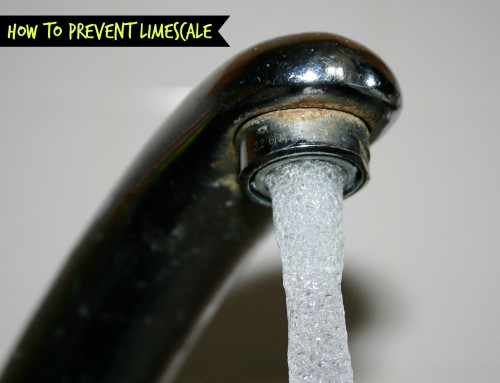Anyone who lives in a “hard water” area will know that limescale deposits are a problem. Limescale is a chalky, hard substance that builds up due to calcium carbonate deposits in water. Limescale can cause problems such as reduced water flow in taps and pipes, build-up on bathtubs and sinks and blocking the flow of water in shower heads and boilers.
Drinking water with limescale in it is not harmful. Limescale is mainly formed of calcium salt crystals which should have no negative impact on your health. If you accidentally swallow some of the hard limescale it should just naturally pass through your digestive system. If you’re worried about drinking limescale, you could use a water filter to filter your water before you drink it or fill your kettle.
Limescale can leave deposits on your bathroom and toilet, making it look dirty and unsightly. Even if your bathroom is freshly scrubbed, limescale deposits can make it look grubby. When we moved into our house I thought our bathroom loo was filthy, but after hours of scrubbing I showed it to our builder who tipped some limescale remover down it, and within a couple of hours it was like new again.
For tackling bathroom and kitchen limescale there are a number of household products available which are easy to use. These may require a couple of hours to soak off the limescale deposits. Failing that, if your limescale is stubborn, there are companies who can come in and deal with it for a fee.
Likewise with your washing machine and dishwasher, additives can be used to help prevent the build up of limescale deposits. These are fairly inexpensive compared to having to repair or replace your washing machine regularly.
If you’re concerned about chemicals in your home, vinegar or lemon juice is said to be good for dissolving limescale, though you may need to soak the limescale in vinegar for some time. If the limescale is stubborn you may need to soak it for a number of days. I’ve done this with a shower head which took several days, but it did work.
Dealing with limescale deposits in a hard water area is an ongoing and potentially expensive job. You will need to keep on top of it and have regular descaling sessions of your various appliances.
Alternatively, there is a product called Combimate which helps to prevent the build up of limescale in your home. Combimate adds Combiphos to your water and is quickly and easily fitted onto the incoming cold feed pipe to a combi boiler. The Combiphos helps to prevent limescale deposits in the heat exchanger and will reduce limescale formation in the boiler, appliances and in your hot taps and is completely safe to drink and use.
Combimate is easy for any plumber or competent DIY enthusiast to install. It doesn’t require any electrical work or special tools. It can protect boilers and appliances against limescale formation and corrosion, help to keep your energy costs down and can extend the life of your kitchen appliances.
There are several ways to keep on top of your limescale problem, but as with everything, prevention is often better than the cure. Do you have any top tips for dealing with limescale?

= In collaboration with Combimate =
